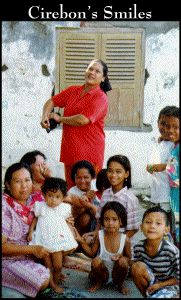 [Note: the Coca Cola bottle cap has the word HALAL on it, meaning that it is permitted by Islamic Law]
[Note: the Coca Cola bottle cap has the word HALAL on it, meaning that it is permitted by Islamic Law]
Specific religions are accorded a high level of respect by their individual devotees, though often much less so by others. To preface the following, few brief comments about our exposure to Indonesian Islam, I would like to remind you that the author comes from a nominally Christian state where mass media references to Muslims are made, almost exclusively, in stories focusing on terrorism. Most Americans would be surprised to learn that Indonesia is predominantly Muslim. So we are not so far removed from the colonial days when empires' representatives officially referred to this religious group as Mohammedans. This first exposure of an Islamic community for me, then, is just that and I apologize to Muslims for my shallow treatment of their expression of beliefs in advance.
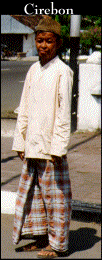 One day while I was exploring a kampung in Cirebon, a young girl asked me if I was Islam [sic]. I was a bit surprised at her question because she wasn't one of the girls donning a tudung, and I told her I wasn't. I also told her that there weren't too many from where I had come. I don't know if she comprehended my English, but it seemed a surprise enough to her that I wasn't Muslim.
One day while I was exploring a kampung in Cirebon, a young girl asked me if I was Islam [sic]. I was a bit surprised at her question because she wasn't one of the girls donning a tudung, and I told her I wasn't. I also told her that there weren't too many from where I had come. I don't know if she comprehended my English, but it seemed a surprise enough to her that I wasn't Muslim.
At 5:40 p.m. and other specified times during the day in that coastal city, the sounds of various Muslim calls prayer overlap each other in the air that blankets the residential neighborhoods. Some of the men go the the mesjid to pray others pray in prayer rooms or wherever a blanket can be laid down. When we were still in Bandung, our room was located next to an alcove where the Muslim family who owned the small hotel would pray and we would feel uncomfortable that we may interfere with someone's prayers just outside of our bathroom. Dadang explained that he prays five times a day, and that if he misses one of the scheduled prayers, he has to double up on the next scheduled prayer. He took our questions about Islam very seriously and was much more devout that some of the other Indonesians we later met. During our conversations with him, we asked why we never saw any dogs. He told us that Muslims belief that a malaikat (an angel) will not enter a house where there is a dog and give rakmat (I couldn't find a definition for this word, but recalled that Dadang explained it was something akin to a blessing). Indonesians begin learning Arabic at the mesjid (mosque) as early as six years old. After they begin general instruction, some boys and girls attend pasantrin, a term for Muslim instruction that is held at public schools after regular instruction is complete for the day. Dadang can write in Arabic because of this education.
There are three basic requirements for being Muslim: to believe that there is one God and Muhammed is his messenger, to be circumcised, and to bury your dead. Dadang explained to us that many Indonesians do not practice death ceremonies properly, according to the Qu'ran because they have a feast of sorts, a tradition that dates back to pre-Islamic days when Hinduism was the dominant religion. In Solo, sometime later, we learned that Muslim boys are circumcised when they are twelve or thirteen years old. After the circumcision, boys wear a steal stem, called a cendkalan, that juts out protectively from their waist and extends the sarung they also wear during this period, to protect their penis while it is healing.
Dadang's girlfriend wears a jilbab*, and he expects that whoever his wife will be someday, that she will also wear a jilbab (* a tudung, or scarf that Muslim women wear to conceal their hair - at the time we assumed that this was an Arabic or Indonesian word, but it doesn't appear to be so we think it may be a Sundanese word). Even though he doesn't wear a songkok, Dadang believes that women who wear jilbabs are more beautiful perhaps in part because they are more devout as Muslims and therefore make better wives. I asked Dadang about Islamic rules governing multiple wives and he explained that there is a limit of four wives, but the practice of having multiple wives is uncommon and he knows of no one who has more than one wife.


|
|
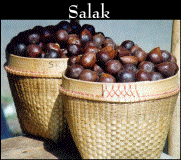 On our way from Bandung to Cirebon, we passed through the town of Sumedang where there were numerous places selling tahu, fried tofu. Further along on the road, I noticed each kampung* was represented by a string of roadside, wooden stalls where specific foods that they seemed to specialize in were being sold such as melons, mangoes, and salak, a small fruit with a brown skin that has a pattern similar looking to a snakeskin. [* a kampung is literally a village, but also refers to residential communities within cities; a desa is a rural village] On our way from Bandung to Cirebon, we passed through the town of Sumedang where there were numerous places selling tahu, fried tofu. Further along on the road, I noticed each kampung* was represented by a string of roadside, wooden stalls where specific foods that they seemed to specialize in were being sold such as melons, mangoes, and salak, a small fruit with a brown skin that has a pattern similar looking to a snakeskin. [* a kampung is literally a village, but also refers to residential communities within cities; a desa is a rural village]
|
In my mind, I try to balance out my desire to treat the hosts of wherever I visit with respect and my desire to explore. When exploring, this means being sensitive to and responding to the people that I encounter. Not satisfied with the rather monotonous sites offered in the center of Cirebon, I suggested to Karen that we explore a kampung on the perimeter of the business center. It was late enough in the day that the children had come home from school, but early enough that most of the men were gone working somewhere else. The narrow streets were lined with life: woman talking or purchasing some groceries from a vendor, grand parents resting in the porches in front of their houses, young girls with their babies, and children roaming the streets playing. The children were all smiles and everyone seemed pleased to have their photos taken. The were so pleased, in fact, that I was pressured to take pictures when I didn't want to. Sometimes I refused, and on one occasion, when I pretended to take a photo, I was found out and mildly criticized.
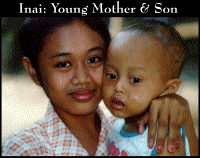
I chose the words "young girls and their babies" above, because it was not uncommon to see girls in what appeared to be their mid-teens holding babies in their arms. That they were the mothers of these children, there was no doubt because their own mothers would take pride in the fact that I wanted to take a picture of their daughters holding their granddaughters (and as I later learned, the red dye on their fingers and sometimes feet was a Muslim sign that they were married). It is somewhat shocking at first to see something that is so disparaged in your own culture, yet a moment's reflection is enough to win your understanding and respect. Their husbands are but a year or two older and the extended families support the raising of the children.
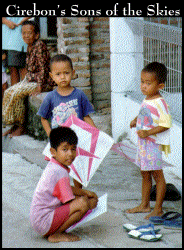 Just before sunset in Cirebon, the skies become active with kites ascending into the sky above the tiled roofs capped with television antennas. This apparent favorite pastime of Cirebonese boys still dominates over other recreational activities, surprisingly, even television. Flying kites in Cirebon is not an activity solely between the kite and the navigator, it is a social activity shared by groups of boys. Noticing the vast number of kites flying through the sky and the broken and whole kites dangling from television antennas, telephone wires, trees and anywhere else you can imagine, I could only wonder how long this outdoor activity could keep hold over the youth of Cirebon in this developing country.
Just before sunset in Cirebon, the skies become active with kites ascending into the sky above the tiled roofs capped with television antennas. This apparent favorite pastime of Cirebonese boys still dominates over other recreational activities, surprisingly, even television. Flying kites in Cirebon is not an activity solely between the kite and the navigator, it is a social activity shared by groups of boys. Noticing the vast number of kites flying through the sky and the broken and whole kites dangling from television antennas, telephone wires, trees and anywhere else you can imagine, I could only wonder how long this outdoor activity could keep hold over the youth of Cirebon in this developing country.
Our fascination and appreciation for batik grew in our journey through Java, but there were times that Indonesians seemed to possess an equal fascination with my habit of wearing shorts in public. In Cirebon, some of the younger boys, I noticed, didn't seem to care that I wore shorts because they did too, but once they get to the age of puberty, when they stop wearing shorts, they began snickering or staring at my legs with some sort of amazement or disdain. Some of the more religiously conservative elderly people clearly had disdain for my wearing shorts, but in the eyes of many Indonesians, it was acceptable for me to do so most of the time because I was a foreigner. I wasn't about to give up wearing shorts because I had only brought one pair of long pants and besides I was bathing in sweat day-in and day-out as it was.
Of all the places we've visited, Indonesia seems to have been the one that was the most magical. This wasn't something that we realized while we were there. It was something that we realized shortly after we had left. When I try to remember what made it so magical I can come up with a long list of things. When I try to remember when the magic of this nation became apparent to me, I'm lost. Our experience, the complexity and beauty of it was something that grew, layer upon layer. The first layer was our meeting with Dadang and the insight he gave me into his character through his openness and his love for Islam. The second layer was our introduction to batik near Cirebon at Trusmi and Paoman, and further explorations of it in Yogyakarta and Solo.
